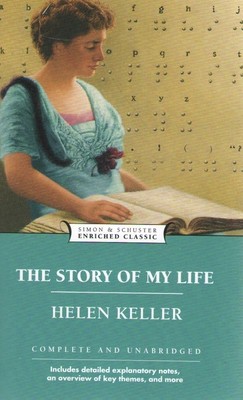Silence sits immense upon my soul

The Story of My Life
by Helen Keller
I had of course heard of Helen Keller and, knowing that she became a highly respected feminist, socialist and equal rights activist, I thought the story of her life might be pretty interesting. However, this book was written when she was in her early 20s, still studying at university, so really it’s all about her being deafblind. And that could still have been good, but, well, I found it odd.
That’s not to say it’s badly written, or even bad. For those not familiar with her, Helen Keller was the first deafblind person to receive a bachelor of arts degree, back in 1904. The fact that she was educated at all was pretty unusual for the time, and when she showed intellectual promise she became a bit of a sensation, which I guess is why she was able to publish an autobiography when she was still so young.
“When I try to classify my earliest impressions, I find that fact and fancy look alike across the years that link the past with the present. The woman paints the child’s experiences in her own fantasy.”
It’s certainly interesting to read a first-hand account of her early education – being introduced to the concept of words and language is already something I find fascinating, but how do you bring that concept to someone who can neither see the objects nor hear the words?
“Children who hear acquire language without any particular effort; the words that fall from others’ lips they catch on the wing, as it were, delightedly, while the little deaf child must trap them by a slow and often painful process. But whatever the process, the result is wonderful.”
The answer is largely via touch. Keller lost her sight and hearing aged 19 months and didn’t begin her education until she was 7. In-between she had formed her own understanding of the world through touch and an improvised sign language and remembers happily playing with the cook’s daughter and her own little sister. But once her family employed Anne Sullivan, a partially blind woman who had attended a special school for the blind, as her governess, she finally discovered language.
“There is nothing more beautiful, I think, than the evanescent fleeting images and sentiments presented by a language one is just becoming familiar with – ideas that flit across the mental sky, shaped and tinted by capricious fancy.”
It does suffer from being written by someone so young. It’s a bit naïve and quite defensive – I get the impression negative things had been written about her in the press and one of the aims of this book was to redress those points, which is understandable but doesn’t make for great writing. She also generalises quite a lot, not acknowledging that her situation is unusual not just because of her disability but equally because of the help she received.
It may seem like an odd reaction, but it bothered me that Keller didn’t seem aware of her advantages in life – clearly her family had money to invest in her education and her little bit of fame helped her too. Admittedly, the final chapter is basically one long acknowledgements section, but really many of those names and anecdotes should have been integrated into the main story, rather than it appearing that she got everywhere she did under her own steam. I know it’s not her fault that she is so often dependent on others, but I found it very odd to read, for example, the sentence “I enjoy a spin on my tandem bicycle” with absolutely no mention of the fact that someone else would always have to cycle it with her.
It is weird now how she was considered such a sensation purely for her disability, and perhaps I am a little hard on her because the tone is so very much in the vein of ‘look how much I’ve achieved’, which I find grating. Knowing that she later used her education, fame and experience to help others softens me toward her, but she isn’t yet that person when writing this. I am also a little put off by the religious overtones and language, which are partly of course a product of her time, and possibly even the nature of the books available to her in Braille.
The book is genuinely interesting when she discusses how she interacts with the world and how she learned to communicate – I would have liked more detail about that. In the early chapters you might be forgiven for not being sure what her disability is, as she often describes sights and sounds. It is quite a long way through the book when she acknowledges that “so many of my impressions come to me through the medium of others’ eyes and ears”. I loved the descriptions of her conversing with others by placing a hand on theirs as they sign words letter by letter using ASL. Or of her reading lips using her fingers. It is so hard to imagine and she manages to at least open the door to her world a crack.
“Silence sits immense upon my soul. Then comes hope with a smile and whispers, ‘There is joy in self-forgetfulness.’ So I try to make the light in others’ eyes my sun, the music in others’ ears my symphony, the smile on others’ lips my happiness.”
First published 1903.
Source: Project Gutenberg.
Challenges: This counts towards the Rory Gilmore Reading Challenge.
This is not someone I have ever read about, it sounds really interesting.
Lainy http://www.alwaysreading.net
P.s I love the blog title
Lainy She’s definitely an interesting person to learn about.